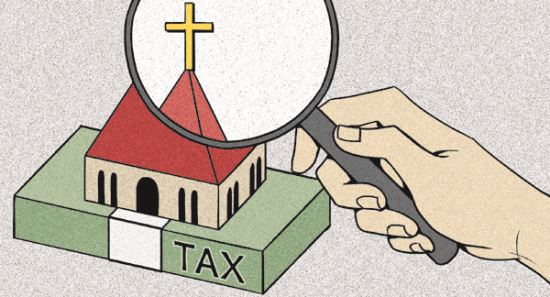Posted on : Dec.22,2017 19:23 KST
Modified on : Dec.22,2017 19:32 KST
Critics blast the proposed measures as “sham taxation”
After recent remarks by Prime Minister Lee Nak-yon on bringing income taxes for religious figures “in line with the public’s expectations,” the Ministry of Strategy and Finance (MOSF) submitted a revised plan on Dec. 21 requiring the reporting of religious activity allowances to tax offices – but the controversy over “special treatment” continues unabated.
On Dec. 21, MOSF announced plans for an amendment to the enforcement decree for the Income Tax Act. The changes would maintain the tax-exempt income status of religious activity allowances – the chief focus of the controversy – but require religious groups to report details every year to the tax office in their jurisdiction.
The revisions are to promulgated by the end of this year after reviews at a vice ministers’ meeting on Dec. 22 and a Cabinet meeting on Dec. 26. MOSF has stressed the significance of taking a first step in the 50 years since the need to tax religious workers was first raised. But critics continue to accuse the Income Tax Act and its enforcement degree of severely compromising the basic principle of fairness in taxation. The group People’s Solidarity for Participatory Democracy (PSPD) called the measure “sham taxation,” claiming on Dec. 21 that “even a tax audit would be just a formality, since the religious groups themselves decide the scope of taxable income for religious workers.” The following are some questions and answers about the taxes on religious workers.
―Why haven’t religious workers been taxed to date?
In the past, South Korea customarily treated religious workers’ income as tax-exempt. In 1968, inaugural National Tax Service director Lee Nak-seon announced plans to assess a Grade A earned income tax on religious workers, only to withdraw them after an outcry from the religious community. In 2013, the administration proposed an Income Tax Act amendment to eliminate a “taxation blind spot” by extending taxes to religious workers. National Assembly legislation came in 2015 after two years of review; following a two-year grace period, taxation of religious workers is set to begin on January 1 of next year. All OECD member countries with the exception of South Korea tax the income of religious workers.
―Why are people claiming “special treatment” in the taxing of religious income?
First of all, the tax burden is small, with religious earnings classified as “other income” rather than “earned income” as stipulated by the Income Tax Act. A new category for religious income is being established under “other income.” While the taxation rate is the same as for earned income, 30–80% of necessary expenses can be deducted for “other income.” This means that in the case of a family of four earning 50 million won (US$46,500) a year (4.17 million won a month), the amount of tax withheld for a religious worker would be 50,730 won (US$47.20) a month, or half what a wage earner would pay.
Second, the scope of taxation is narrow. The amended enforcement decree limits the scope of religious workers’ earnings to “income received from the religious group with which they are affiliated.” This means that they will not be taxed for earnings given by other religious groups or individuals.
―Why were the “religious activity allowance” terms revised?
In the original enforcement decree for taxing religious workers, tax exemptions were limited to educational expenses (tuition and course fees), meals and food allowances, travel costs, garments and paraphernalia for religious ceremonies, and payments due to acts of God or disasters. But the amended enforcement degree presented by MOSF on Nov. 27 included a new exemption for “religious activity allowances” received for use in religious activities.
The move prompted a heavy backlash, with critics claiming it would grant religious groups a loophole for avoiding taxes by simply paying “religious activity allowances” regardless of amount – in other words, reducing religious workers’ salaries and increasing their activity allowances instead. In response, MOSF moved to require that the allowances be reported every year to the presiding tax office. While the measure did bring religious groups in line with ordinary taxpayers in terms of their obligation to report and cooperate with taxation, the fact that unlimited exemptions remain in place is perpetuating the controversy.
―Are religious earnings not subject to tax audits?
According to the Income Tax Act, religious workers’ income is subject to tax audits. But the audits are restricted to “those of a religious group’s ledger, document, or other objects that are related to religious workers’ income.” No precedents exist for restricting the scope of a tax audit for one particular job class. To carry this out, the administration has required religious groups to maintain separate accounting for religious workers and religious groups. The religious group’s accounting ledger is not subject to tax auditing. While there have been complaints that this violates equity with ordinary taxpayers, the decision was made to keep it in place in light of the Income Tax Act’s aims.
―How much are religious workers’ earnings taxed?
An estimated 46,000 of South Korea’s 230,000 religious workers, or around 20%, do not pay any taxes at all. The Catholic Church (1994) and Anglican Church of Korea (2012) have been paying taxes voluntarily at the denomination level, with additional tax revenues estimated at over 10 billion won (US$9.3 million). Indeed, there is a possibility that tax revenues could drop, since most religious workers have small incomes and would be eligible for earned income and childbirth encouragement credits after necessary expenses, basic deductions, and personal allowances.
By Jung Eun-joo, staff reporter
Please direct questions or comments to [english@hani.co.kr]









